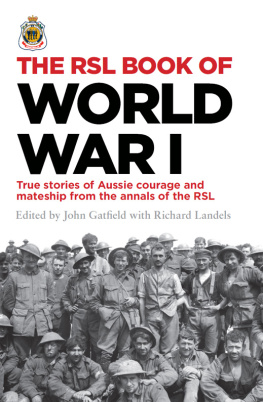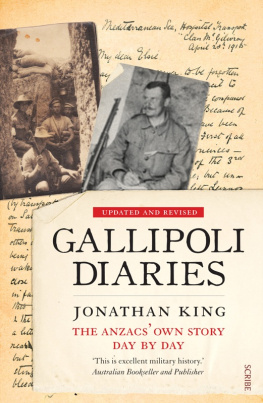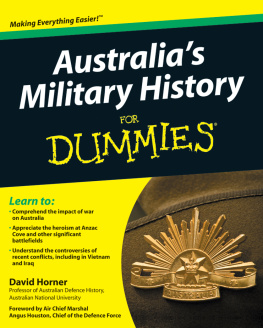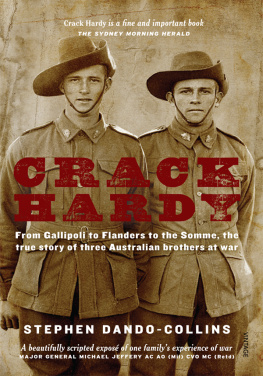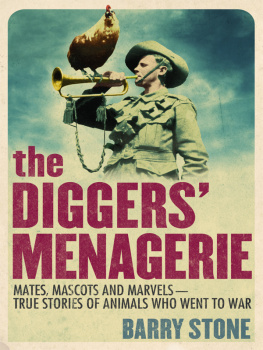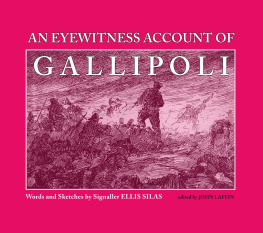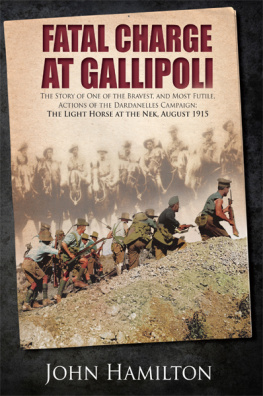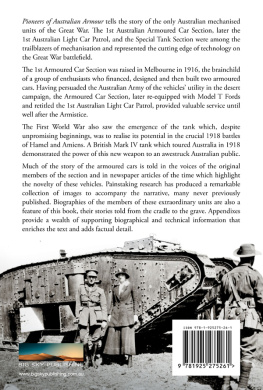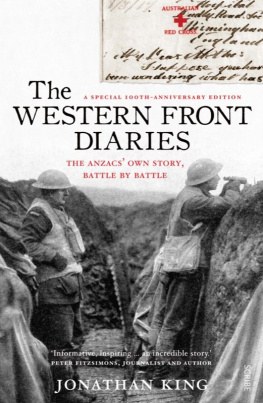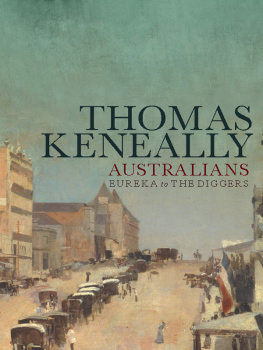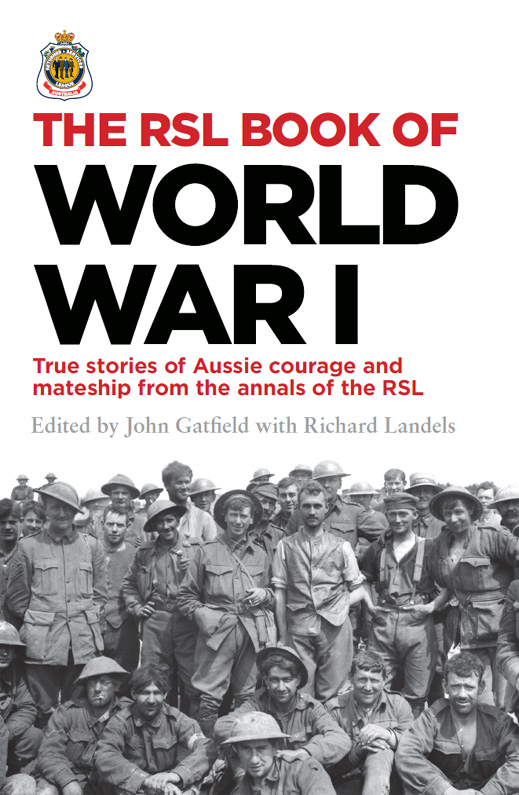Contents
Menin Road: September 1917
From a Soldiers Diary
Propaganda Led to Record Number of Prisoners
From a staff officers notes
The Largest Single War Trophy
From a staff officers notes
Wounded and Taken Prisoner at Bullecourt
Diary of Private Cecil Arthur Crews
A century after the cataclysmic events of the world war that was thought of at the time as the war to end all wars, it is fitting that the Returned and Services League of Australia should commemorate the stories of the men and women who served.
Most often those writing about war focus on the broad sweep of history, or on why one side or the other won a particular battle, or on the actions of political and military leaders. When stories about individuals are included in such histories, they tend to feature specific acts of valour or military consequence.
This history is markedly different. Its focus is on the experiences of individuals, as recorded by the participants themselves. As such it is an authentic reflection of how those caught up in the Great War of 191418 saw their involvement. They do not dwell on grand strategy, or on the political implications of their actions. Instead they recount what happened to them and to their mates.
This, then, is a series of stories about Australians going to war, seeing and doing things which prior to August 1914 they could never have imagined they would experience. These very personal accounts provide a rare insight into how Australians most of them very young coped when sent in harms way. From the tropical steaminess of what was then German New Guinea to the challenging terrain of the Gallipoli peninsula and the expanse of the Arabian desert, these stories reach out from the past to remind us what our forebears endured.
They record the excitement and horrors of battle, the extraordinary courage of ordinary men and women, and the irrepressible larrikinism of boisterous young men who, when not face to face with the enemy, found opportunities for fun and camaraderie even at the front.
The RSL was founded by such men in 1916. Having endured the tragedy of war, and looking for a means of coming to terms with its aftermath, they saw a need to bond and to support their mates. They were also determined to look after the families of those who had paid the supreme sacrifice or who had been damaged by their involvement in war.
This bond also allowed them to come together to share yarns and to reflect on their achievements. Many wrote about their experiences for the RSLs various publications. Others had kept diaries or written letters during the war, and it is fortunate that many of these documents survived. This treasure trove of material now allows us to hear from them what they saw, how they felt and what they thought they had achieved.
This is a book of which every Australian can be enormously proud. The members of the RSL hope you enjoy its contents.
Rear Admiral Ken Doolan AO RAN (Retired)
National President
The Returned and Services League of Australia
When the first Australian soldiers returned from Egypt, embarking from Suez on the hospital ship Kyarra on 5 February 1915, they quickly understood that an organisation was needed to advocate for their welfare and resettlement. From that nucleus grew what we know today as the Returned and Services League of Australia.
While the RSLs priority has always been the care of veterans and their families, another commitment has been the commemoration of those who did not return, the preservation of that spirit of shared experiences, and the pledge that Australia would not forget the sacrifices of the Great War.
In due course RSL state branches established newsletters or magazines to inform members, to entertain them, and to record their histories. These publications evolved through various formats and titles, but their principal incarnations are The Listening Post (Western Australia), Mufti (Victoria), Reveille (New South Wales), The Queensland Digger (Queensland), On Service (Tasmania) and The Signal (South Australia).
From these magazines has come this remarkable account of the Great War, 100 unique experiences by 100 authors. These are factual accounts, most of them written by veterans for one another to read. Published as they were in veterans magazines, there was no tolerance for errors of fact or opinion. Many were written five, ten or twenty years after the event, sometimes in anniversary years, but it is clear that the emotions are still raw and the memories vivid. These were shared experiences never to be forgotten.
These stories cover the whole of the four years of 191418, from the first enlistment of volunteers through to the Armistice. There are contributions from airmen and sailors, nurses and padres, officers and privates, highly decorated heroes and those whose exploits were never recognised publicly.
They are written in the language of the day: these soldiers referred to Fritzies and Jacko, Gyppos and the Boche. It would be inappropriate to edit this language, and the stories are printed here as they appeared originally, except for corrections of, for example, the spelling of placenames, the standardisation of certain spellings, and the formatting of numbers and dates. A few stories have been abridged.
Some authors remain anonymous but in each case the context or facts are authentic, and names, units and events were checked against the WWI and embarkation rolls, and in some cases against unit histories. The various magazines sometimes published literary efforts which were clearly fictional or suspiciously close to it, and these were not included.
If there appears to be a geographical bias in the origins of contributors, this is not deliberate on our part. It is simply because some RSL branches encouraged members to write stories for their magazines more enthusiastically than others. The Western Australian branch went out of its way to do this, even producing in 1929 The WA Digger Book, from which some stories have been taken.
The explanatory and biographical notes are mine, included to give the reader a sense of context for the events described, and an insight into the authors age, occupation and education.
The RSL and veterans in general do not seek to glorify war, and nor does this book. It does, however, seek to preserve the collective memory of these veterans, as well as the individual accounts, sometimes horrific, sometimes humorous, but always honest. These are their stories, and theirs alone.
John Gatfield
Once accepted, the would-be soldier is re-born into the army. He brings nothing with him into his military world save the mufti he stands up in, and that, as soon as possible, is shed. He has to be clothed, fed, supplied with all a mans toilet necessities, with blankets, waterproof sheet, eating and cooking utensils, firearms, entrenching tools, spades and picks, and diverse other things. Then, too, he has to be sworn in and finally paid.
Major J.W.B. Bean
An Australian troopship which began its life as a German merchantman, the SS Pfalz drew the first angry shot fired by Empire forces in WWI.
The tale of the mixed fortunes of the SS Pfalz, later the Boorara, began in the Port of Melbourne on 4 August 1914. Rumours of war had been circulating in Australia for weeks and had gained height on 2 August, when the Naval Board set up a Port Examination Service designed to inspect all incoming and outgoing shipping in all major ports.

